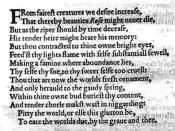The traditional Renaissance sonnets dealt with love or death; sonnet 71 by the Bard of Avon, deals with both love and death. In the early stages of a man's life his primary focus is love, in middle age the focus is the accumulation of wealth. Eventually however, men become preoccupied with the spectre of death.
In Shakespeare's sonnet, "No longer mourn for me," the main character is telling his loved one to let the church bells be the last time you think of me. When Shakespeare says, "I am fled from this vile world, with vilest worms to dwell," it seems to me his overall existence in this world, for whatever reasons, was not a particularly pleasant one. The author does not disclose what about his life distresses him, but it is clear that leaving it will ease his suffering.
"Remember not the hand that writ it... if thinking on me then should make you woe."
This is a plain declaration that he would rather have his love never think of him again if it would bring her woe. The use of the word "if" implies that if she were to have pleasant remembrances he would not want to rob her of those. He is hoping that she would remember her him well.
In the third quatrain he tells his love when his body becomes worm food, "compounded with clay," to also let any unpleasant memories fade. In the cuplet, his final thoughts reflect his fears that his life's deeds would be a source of ridicule for his lover. Therefore she should not publicly bemoan his passing.







